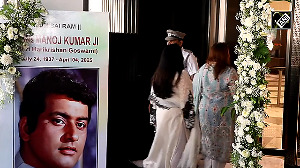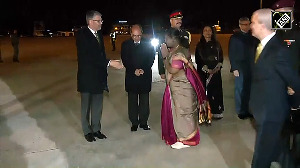Part I: Fumbling away our advantages
By appearing to cave into American strong-arm tactics regarding Iran, India lost a great opportunity to signal buyer power to the US. When the non-proliferation ayatollahs made noise, India could have reacted by saying that perhaps the July Indo-US agreement on civilian nuclear power was not all that great, and perhaps India really didn't want it.
India votes to refer Iran to UNSC
And oh, entirely by the way, India was reconsidering the big order with Boeing for Air-India, and was going to re-invite Airbus to bid on it. And that now that Pakistan is getting P3-C Orions from the Americans, India was going to eliminate American firms from consideration for its future needs for advanced jet aircraft.
I guarantee that this would have got the American military-industrial complex's attention, and the US Trade Representative would have been India in 24 hours flat trying to save that deal. They would have caved in, for the putative Indo-US nuclear agreement is such a sweet deal for them that they wouldn't want to jeopardise it.
On the contrary, India has signalled that it is so desperate for that deal that it will do things that it really doesn't want to do. This gives the Americans a chance to arm-twist India, and increase their supplier power at India's cost. This is nothing short of criminal incompetence. Remember how Mahathir Mohammed once brought the supercilious British to their knees by cancelling all contracts with the UK? The British grovelled and practically fell at Mahathir's feet to get reinstated. India could do something along those lines with the Americans.
India doesn't realise its own strength. Look at that July agreement with the US more carefully: it is a one-sided affair. India has committed itself to doing lots of things -- whereas the Americans have said they will 'try to do' certain things.
There is the pithy statement contrasting 'committed' and 'involved': when you have bacon and eggs for breakfast, the chicken is involved, but the pig is surely committed. Similarly, the US is involved, but India is committed. This is the essential asymmetry and unfairness of the deal. Indians accept the obligations of the P-5 (five permanent members of the UN Security Council), but get none of the rights.
Separating civilian and military nuclear facilities, accepting IAEA inspection of all civilian facilities, adhering to the Additional Protocol: all this is more than the P-5 do. It is a total cave-in by innocents out-negotiated by canny Americans. This is 'cap, rollback, and eliminate' by other means: long the mantra of the State Department.
Everything that the Americans have said is weasel-worded: 'we'll work with Congress and allies to do xyz,' whereas Indians have obligated themselves to do things. The Congress and its pack of baying non-proliferation ayatollahs will not agree to anything substantive. But India will open its kimono to intrusive inspections by the IAEA. Note: The last time there were intrusive inspections, they invaded the country: Iraq. The IAEA finds weapons of mass destruction on demand.
The Americans are also not exactly well known for adhering to treaties. Here is what I expect they will do: hide behind the fig-leaf of a recalcitrant Congress. They shrug, 'You know the Congress and tough guys like Tom Lantos and Bernie Sanders, what can we do?'
The only dim ray of hope I see is that Indians could reciprocate: 'We couldn't get the thing ratified in Parliament, very sorry. You know those difficult people like Sitaram Yechuri and Prakash Karat who hate your guts.' That would be one way to slime out of inconvenient treaties.
But the deeper point behind this is that India once again is not using its buyer power. Note what has happened in this entire negotiation: the thing that India covets the most, Security Council membership, is not on the cards. The US has declared several times that it supports Japan's membership, but nobody else's. So it is not as though the US is doing India any big favours.
The sharing of civilian nuclear technology is something that the US needs to do, to give its moribund nuclear industry a boost. The US, in the wake of Iraq, Hurricane Katrina, etc, is aware that it has to reduce its crack-like addiction to hydrocarbons and increase other sources of energy. Nuclear power has a bad image in the US, so its suppliers cannot do much in the US: what better than to have them build (potentially dangerous) plants elsewhere, perfect the technology, and bring it back to the US later? And if said suppliers can make good money in the process, so much the better. Who cares if a couple of Chernobyl-type situations happen and a bunch of Indians die?
Note that despite all their hoo-haa over non-proliferation when it comes to strictly law-abiding and unproliferating and easily cowed India, the US has allowed Westinghouse to sell China a number of reactors despite China being a major and consistent proliferator. So it's a purely commercial decision to sell the technology to India, and it is once again, not as though the US is doing India any favour: it is merely acting as a mercantilist entity and squeezing the maximum value out of a deal which it also needs.
Bottom line, by not recognising its own strength as a major customer for not only energy, but also for aerospace and weapons systems, India is hurting itself. This stems from the old inferiority complex of being a NAM/Third World country, a supplicant. It is high time the diplomats realised that we have shaken off the detritus of NAM, and that India is a rising power, which can in fact be the world's number one power.
India needs energy, and the US
A declining America and a China which will in future face serious internal problems -- this leaves the door open for India to be, yes, astonishing as it may be to some, the world's greatest power. And that should be India's strategic intent. Nothing else is worth working hard for: this is the kind of goal, like the US's man-on-the-moon, that will excite people. This is no pipe-dream either: been there, done that.
As tracked in Angus Maddison's The World Economy: A Millennial Perspective during the years 0 to 1000 CE, India was pretty much the pre-eminent economic power in the world, with China trailing close by. And the 1017 CE military feat of Rajaraja Chola in sending a conquering armada of sailing ships to defeat the Sriwijaya Empire in Sumatra -- all the way across thousands of miles of the Indian Ocean -- was unmatched until the heydays of European colonialism.
Comments welcome at my blog at https://rajeev2004.blogspot.com






 © 2025
© 2025